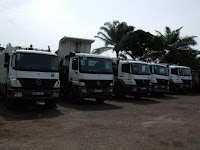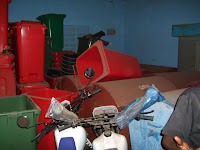Kissy is in the east of the city and is along the main route out of Freetown. It's not far from the works yards which are also located in this part of the city.
It's similar to Kingtom but probably worse. Kingtom has been created on an area of flat land through the middle of which a road runs. In the wet season half of the site is given over to farming because the land is not stable enough to cope with vehicles. Despite the lack of any earth moving equipment to keep the piles under control or the absence of any sorting it works, after a fashion.
Now the situation is that they can't drive onto the dump. So it's entirely blocked from any new waste being dumped there. The result is they've started a third dump somewhere else where there was a whole.
During this visit we heard that a perfect location has been identified by the World Bank, somewhere that the waste could be properly managed and the landfill engineered well away from the residential areas it currently juts up against. Of course there's nothing to guarantee that people won't encroach upon that piece of land, or scavenge for whatever they can lay their hands on. But even before that becomes an issue there are a number of hurdles to overcome. One of the key obstacles is the logistics of the thing.
And that comes back to Freetown's roads.
This third site is down the road between Hastings and Waterloo. So it fits the bill for being out of town.
 It isn't near a water course and it could be engineered from scratch. However, it's hard enough for the 7 working vehicles to service the 45 transit sites and include regular trips to Kissy or Kingtom. For them to have to add an out of town excursion to that means more time sat in traffic, more strain on the vehicles, less time actually collecting the rubbish.
It isn't near a water course and it could be engineered from scratch. However, it's hard enough for the 7 working vehicles to service the 45 transit sites and include regular trips to Kissy or Kingtom. For them to have to add an out of town excursion to that means more time sat in traffic, more strain on the vehicles, less time actually collecting the rubbish.And then there's the economic ecosystem that lives off the existing sites. In the vacuum that had been left by waste no longer being filled at the farthest limits of the site there had been a lot of encroachment (this is the point being made at the beginning of the video). This is one of the hardest things to fathom about our time in Freetown - it's not just a dump, it's a home, a source of income, a source of food and a social space. The images of kids playing with kites, of parents carrying babies around, of whole lives found living on the edges is harrowing and difficult. We don't want people to be living on a landfill site but the reality is that this is a crucial slice of the economy in a city where there aren't exactly an abundance of different ways to make money. Perhaps a properly engineered landfill could see waste being sorted and might enable stuff to be retrieved without having to pick through the detritus of the city but it's likely that won't cushion the fall out and the repercussions on those lives we catch sight of in this video.
EAVB_OOSNYLTGFR






